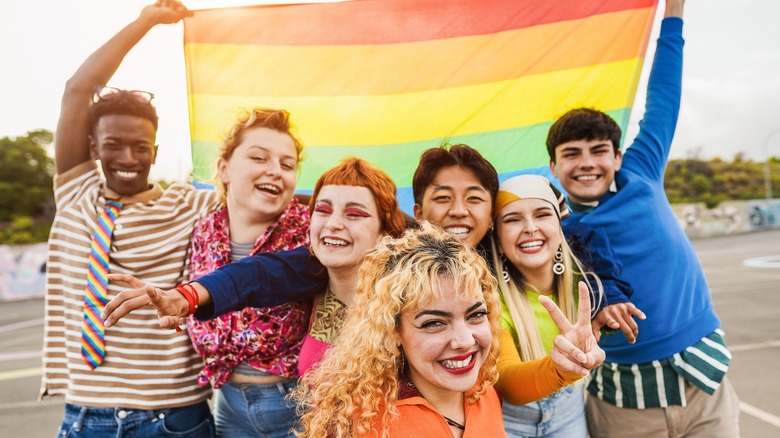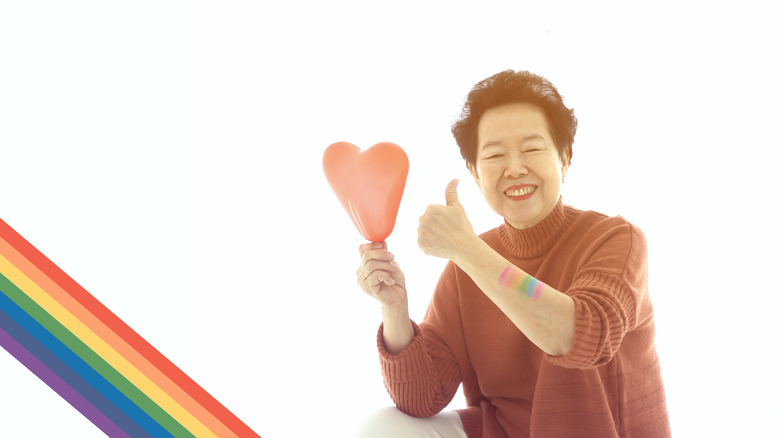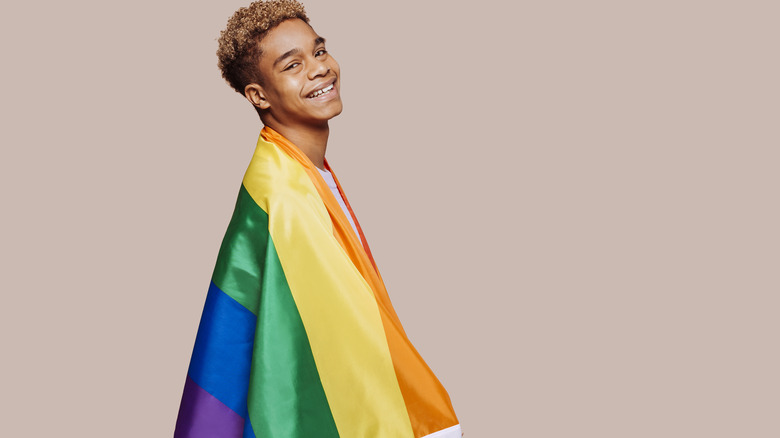What Not To Say To The Parent Of An LGBTQ+ Child
Even if you're not aware of it now, chances are that you know at least one family who has a child who identifies as part of the LGBTQ+ community. There are currently nearly 2 million LGBTQ+ teens aged 13 to 17, according to the UCLA Williams Institute School of Law. But, while all parents have hopes and fears for their children, parents of children in this community have unique concerns about their children's safety and well-being. More than 1⁄3 of all LGBTQ+ individuals reported experiencing discrimination of some sort in 2020, per American Progress, and more than 1,100 hate crimes were committed against gay persons that same year, according to Statista. Tragically, LGBTQ+ teens are also at a greater risk of suicide than their hetero peers, per The Trevor Project. For this reason, families may be cautious about sharing information about their children's sexual or gender identity with their friends or even close relatives.
If a family member or friend tells you that one or more of their children identifies as LGBTQ+ — lesbian, gay, bisexual, transgender, queer, or questioning — know that you're being entrusted with a highly personal and sensitive piece of information. It's important to know not only what to say, but also what to avoid saying if you want to be an ally.
If you or anyone you know is having suicidal thoughts, please call the National Suicide Prevention Lifeline by dialing 988 or by calling 1-800-273-TALK (8255).
Steer clear of these phrases when talking to the parent of an LGBTQ child
When someone lets you know that their child identifies as LGBTQ+, they want your support, not your sympathy. Avoid saying "I'm sorry" or "That's a shame," which suggests the news is embarrassing or shameful. McKenna Meyers, the proud mom of a queer son, tells We Have Kids that she's tired of hearing the question "Is he sure?" But, Meyers is especially offended when family members and friends ask what "turned him gay," which suggests she could have affected his sexuality in some way. "I felt like I was being accused and needed to defend my parenting," she writes.
Another comment to avoid is "We love him anyway," which implies someone should be unlovable because of their identity. "She doesn't look gay" and "He just hasn't found the right girl yet" are also offensive. Finally, "It's too bad you won't have grandchildren" should also be avoided, as IVF, surrogacy, and adoption are all options for gay parents. Calling LGBTQ+ identities a "trend" or "choice" implies that the child has control over their sexual identity. In fact, a major study of human sexuality found that a number of biological and environmental factors affect one's orientation, per NPR.
If the parent tells you that their child is transgender — meaning they identify with a gender other than the one given at birth — don't flood them with personal questions or comments about surgery or trans rights. Expressing an unwanted opinion may destroy your relationship with the family for good.
Let the parent take the lead
Parenting is hard enough as it is, but it can be even harder if a parent doesn't feel supported. With that in mind, be respectful when a friend or relative tells you that their child is LGBTQ+. Let them take the lead; instead of jumping in with your own reactions, let them know that you appreciate their trust in you. Then you can say, "How are you feeling?" This will allow the parent to discuss any concerns or problems.
Another good question to ask is, "What would you like me to know?" This opens the door for the parent to tell you their child's preferred pronouns and other information. If the parent's child is trans, it's likely that they have chosen a new name to reflect their new identity. If that's the case, be respectful and don't use the child's birth name. This is known as "deadnaming" and can be psychologically harmful, according to the Cleveland Clinic.
Some parents of LGBTQ+ youth embrace their child's identity right away, while others may need time and education to get to that point. You can suggest organizations that provide information and support to parents of LGBTQ+ children, such as PFLAG and Healthy Children. The federal Centers for Disease Control has a helpful list of resources for gay youth and their families. But, the most important thing you can say to a parent of a child who has come out contains four little words: "I'm here for you."


